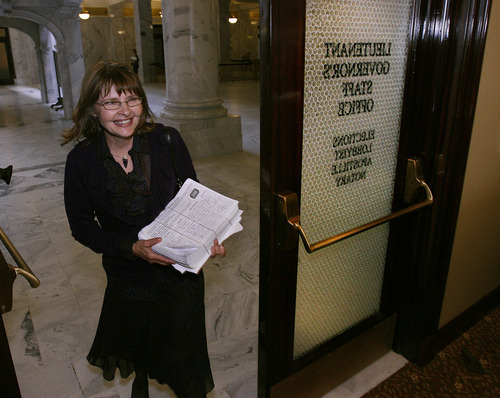This is an archived article that was published on sltrib.com in 2011, and information in the article may be outdated. It is provided only for personal research purposes and may not be reprinted.
A group that aims to select its presidential nominee through online voting at an Internet convention in June says it gathered more than twice as many signatures as it needs to have the winner appear on the Utah ballot next year.
Americans Elect dropped off petitions with what it said were about 4,000 signatures from registered voters to the lieutenant governor's office on Monday.
Mark Thomas, state elections director for Lt. Gov. Greg Bell, said the group needs just 2,000 of them verified to qualify for the ballot. He said his office has 30 days to complete its certification process.
"We're not really a political party, but we're filing as a political party under state law," said Kellen Arno, field director for the group, which has already qualified to appear on the ballot in Alaska, Arizona, Nevada, Kansas, Florida and Michigan, and hopes to qualify in all 50 states.
He said the group will hold a national online convention in June, and anyone can vote who registers to be a delegate at its website, AmericansElect.org.
He said anyone who wants to run can file with the group in April, and people may also draft candidates to appear on its ballots. He said online voters will also determine issues to be debated.
While the group's website says it is trying to create the "first nonpartisan presidential nomination in history," Arno said people are free to nominate and vote for Democrats and Republicans, too. "But one of the major rules of Americans Elect, though, is they are not allowed to pick a person from their own party as a running mate."
Arno said the group is trying to combine high-tech methods with traditional values to "create a better process. And a better process will bring a better candidate."
Catherine Martone of Park City, a volunteer with the group, dropped off the petitions. She said she and her husband are political independents, but they found as they moved around the country when her husband was in the military "that in many states, independents can't vote in primaries."
She said that is why she was attracted to the group and views its process as a way for independents to have a greater voice in presidential politics.
Arno said the group gathered its signatures statewide over about three weeks by using volunteers and paid workers to gather signatures, mostly at libraries, shopping centers and university campuses.



